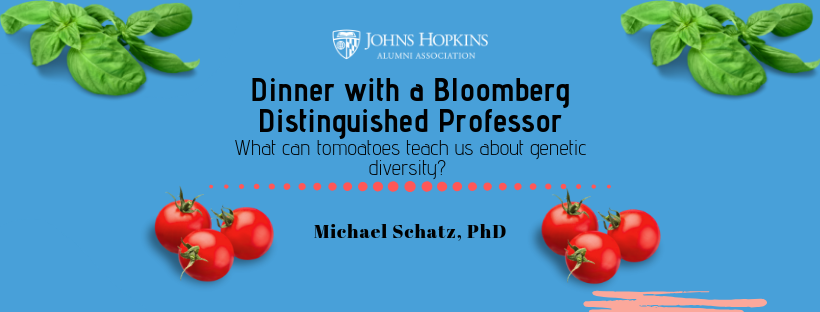New York, NY: Dinner with a BDP, Michael Schatz - What Tomatoes Can Teach us about Genetic Diversity

Affinity Programs and the Office of Research present Dinner with a Bloomberg Distinguished Professor | Mike Schatz, PhD
Why tomatoes? The tomato is among the most valuable crop plants with more than 175 million tons of the fruit, valued at around $85 billion, produced globally each year. Recently, Michael Schatz and his colleagues set out to use long-read sequencing technologies, computational biology, and functional studies for finding and characterizing structural variants in tomato for future studies on everything from natural variation and domestication to crop improvement. In the abstract for Schatz's presentation, he and his co-authors suggested that the same strategy used for the tomato structural variant pan-genome study "will become the new gold standard for [structural variant] analysis in all species."
In his research, Michael Schatz also examines sequence variations related to autism spectrum disorders, cancer, and other human diseases in order to reveal their genetic basis and evolution. He has also recently embarked on creating new computational methods for analyzing single-molecule sequencing, especially plant and animal genomes and transcriptomes, which are the sets of expressed genes in an organism.
We hope you'll join us for an evening of education and exploration with a true Hopkins leader!
Featured Speaker
Michael Schatz is the Bloomberg Distinguished Associate Professor of Computational Biology. He is an expert at large-scale computational examination of DNA sequencing data, including the alignment, assembly, and analysis of next-generation sequencing reads. These methods have been used to reconstruct the genomes of previously unsequenced organisms, probe sequence variations, and explore a host of biological features across the tree of life. Schatz is particularly interested in capitalizing on the latest advances in distributed and parallel computing, especially cloud computing technologies, to advance the state of the art in bioinformatics and genomics. In a recent breakthrough, Schatz was able to create a hybrid software-based solution to eliminate errors in so-called third-generation sequencing. This makes it remarkably easier to compile, align, and analyze full-genome sequences.
Schatz joined Johns Hopkins in 2016 from the Cold Spring Harbor Laboratory where he remains an adjunct associate professor. He has received Sloan Fellowship, NSF CAREER Award, and Genome Technology’s 2010 Young Investigator of the Year.
What's for Dinner?
Table Hors D'Oeuvres
Seasonal Flatbread
Crispy Fried Calamari with spicy marinara
To Start - a choice
Seasonal Burrata
Seasonal Soup
Mediterranean Salad: romaine, cucumber, red onion, baby bell peppers, olives, feta, lemon oregano vinaigrette
Mains - choose 1
Ricotta Gnocchi with truffle cream
Brick Pressed Chicken with lemon chicken jus
Seasonal Salmon
Desserts to share.
Beer and wine will be served.
